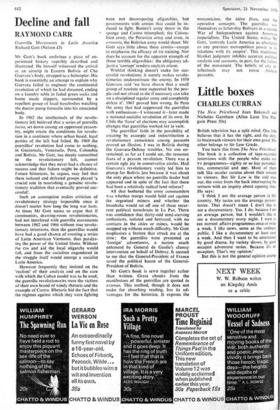Decline and fall
RAYMOND CARR
Guerrilla Movements in Latin America Richard Gott (Nelson £5) Mr Gott's book enshrines a piece of ex- perienced history superbly described and illustrated. He himself witnessed the arrival at an airstrip in Eastern Bolivia of Che Guevara's body, strapped to a helicopter.,His book is essentially an attempt to explain why Guevara failed to engineer the continental revolution of which he had dreamed, ending on a laundry table in faded green socks and home made slippers, surrounded by a repellent group of local busybodies watching the doctor pump formalin into his emaciated body.
In 1962 the intellectuals of the revolu- tionary left believed that a series of guerrilla locos, set down among an oppressed peasan- try, might create the conditions for revolu- tion in a continent where urban based, legal parties of the left had failed. By 1969 the guerrillas' revolution had come to nothing, in Guatemala, Venezuela, Peru, Colombia and Bolivia. Mr Gott, too deeply committed to the revolutionary left, cannot acknowledge that they never had a chance of success and that failure might be definitive. Future historians, he argues, may feel that these isolated and defeated groups played 'a crucial role in nourishing a genuine revolu- tionary tradition that eventually proved suc- cessful'.
Such an assumption makes criticism of revolutionary strategy impossible since it doesn't matter how long the long war lasts. At times Mr Gott seems to argue that if communists, drawing-room revolutionaries, had not interfered with guerrilla movements between 1962 and 1966 without true revolu- tionary intentions, then the guerrillas would have had a good chance of creating a series of Latin American Vietnams, thus paralys- ing the power of the United States. Without the CIA and aid the local oligarchs would fall, and from the socialism engendered in the struggle itself would emerge a socialist Latin America.
However frequently they insisted on the 'realism' of their analysis and on the care with which the Cuban model was to be used, the guerrilla revolutionaries were the victims of their own brand of windy rhetoric and the example of Castro. Rhetoric hid the fact that the regimes against which they were fighting were not decomposing oligarchies, but governments with armies that could be in- duced to fight. Batista's army threw in the • sponge and Castro triumphed; the Colom- bian army, the Peruvian army and even, in extremis, the Bolivian army would shoot. Mr Gott says little about these armies—except to emphasise the efficacy of us training. Nor does he account for the apparent strength of those terrible oligarchies: the obligatory ad- jective 'corrupt' renders analysis otiose.
Wishful thinking doesn't make for suc- cessful revolutions; it merely makes revolu- tionaries underestimate the enemy. In 1959 Guevara said 'we have shown that a small group of resolute men supported by the peo- ple and not afraid to die if necessary can take on a disciplined regular army and completely defeat it'. 1967 proved him wrong. In Peru the army that had suppressed the guerrillas with enthusiasm—I witnessed it—later made a national-socialist revolution of its own. In Chile the 'farce' of elections may accomplish changes that guerrillas worked for in vain.
The guerrillas' faith in the possibility of creating by example and indoctrination a revolutionary conscience among peasants proved an illusion. I was in Bolivia during the Guevara-Debray troubles. No one en- tertained, as far as I could see, the remotest fears of a peasant revolution. There was a certain ugly joy in conservative circles. Had Guevara's revolutionary vanity led him to plump for Bolivia just because it was about the only place. where no guerrilla leader had appeared and in spite of the fact that there had been a relatively radical land reform?
All that bothered the army commanders was whether troops would hold out against the organised miners and whether the brouhaha would set off one of those recur- rent political turnabouts in La Paz. There was confidence that thirty-odd semi-starving enthusiasts, isolated and betrayed, with no contacts in the cities or mines, would be mopped up without much difficulty. Mr Gott emphasises a feature that struck me at the time : the guerrillas were presented as 'foreign' adventurers, a notion much enhanced by General de Gaulle's clumsy intervention on behalf of Debray. It seemed to me that the General-President of France saved the political bacon of the General- President of Bolivia.
Mr Gott's book is sewn together rather than written. Great chunks from the manifestoes of the guerrillas are quoted in extenso. This method, though it does not make for absorbing reading, has its ad- vantages for the historian. It exposes the romanticism, the Mies fixes, and the operative concepts. The guerrillas saw themselves as latter-day Bolivars in a second War of Independence against American imperialism. The United States, writes Mr Gott, 'controls Latin America as absolutely as any previous metropolitan power in its relations with its empire'. This traditional blanket judgment inhibits accurate political analysis and accounts, in part, for the failure of the movement. The beliefs of city in- tellectuals may not rouse Andean peasants.














































 Previous page
Previous page